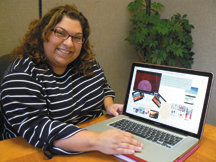When the time comes for a student to do a presentation on a historical figure or a work of literature this school year, some Union City middle school kids may be pleasantly surprised when they’re told to leave their markers and poster boards at home.
And if they’re encouraged to use their cell phones to conduct research for homework and write journal entries, they’ll have Emerson Middle School teacher Ivette Avila to thank.
Avila, a seventh-grade teacher, recently spent a week participating in the Discovery Education Network (DEN) Summer Institute – a program designed to help integrate technology into education.
Hosted by Discovery Education, a division of Discovery Communications (whose networks include Discovery Channel and Animal Planet), the free program included teachers of all subjects from kindergarten through 12th grade.
“It’s more about the thinking process than it is the technology.” – Ivette Avila
________
Launched by Discovery Education in June 2005, the DEN fosters collaboration and helps educators share resources, ideas, and classroom-tested strategies for engaging students in learning and ultimately improving academic achievement.
Avila is one of only 5,000 STAR Discovery Educators (teachers recognized for their efforts to share their expertise) nationwide, and was also recently accepted to be part of the DEN Leadership Council for 2010-2011.
New school tools
Born and raised in Union City, Avila is now raising her own kids there. She has been teaching humanities classes, including language arts and social studies, in the school district for 14 years.
A self proclaimed “geek,” Avila has a personal passion for all things “tech,” which she is eager to share with her students to help them learn to express themselves.
For years, Avila has hosted a personal website to post homework assignments and connect with parents.
She utilizes photos from her own personal trips to historical landmarks, like Gettysburg and Boston, to create interactive videos that teach the kids about history.
She turned a project on historical explorers Lewis and Clark into a digital storytelling experience by encouraging kids to take pictures of “landmarks” with their cell phones on their walk to school and use them to explain their community to hypothetical foreign explorers.
This year, she’s hoping to use online technology like Glogster to turn ordinary papers into an interactive experience.
Avila also said that she is going to try to allow the kids to use Google Docs to write their journals. It’s an eco-friendly option, she said, that can even be texted to her from some of the students’ cell phones – as long as it’s spelled correctly.
Old school techniques
In the age of “Web 2.0,” Avila said the basics are still a mandatory foundation.
To put it simply, “you can’t go on Google and look something up if you can’t spell it right,” Avila said.
Although she encourages her students to utilize their cell phones when doing homework (the district has a strict no cell phone policy during school hours) to do research and communicate, she also makes sure they keep a dictionary nearby throughout the year to prevent them from writing their papers with the same grammar they use in text messages.
“You can make mistakes,” said Avila. “But you have to correct them.”
As a mother, Avila said she’s also a stickler for making sure her students have their privacy and security maintained in what is sometimes a dangerous and scary virtual world.
And though she’ll be teaching her students about new applications like Prezi and Animoto this year, she’ll also be working on penmanship with them, which she called “a lost art.”
“Kids still need to learn the basics,” said Avila. “It’s more about the thinking process than it is the technology.”
Sharing the knowledge
Avila said one of the best things about the summer program is the atmosphere in which all of the instructors share and learn together.
“It’s truly intense,” said Avila of the program, which she also participated in two years ago. “The energy in there is like we could really power the world.”
Avila brought that energy back home to Union City this year by sharing what she learned during a mini-seminar she conducted on Aug. 25, sharing the wealth of knowledge with some of her colleagues.
“I believe in community and giving back,” said Avila. “I was given all these tools and I want to give back.”
For more information about Discovery Education, visit http://www.discoveryeducation.com.
Lana Rose Diaz can be reached at ldiaz@hudsonreporter.com.
